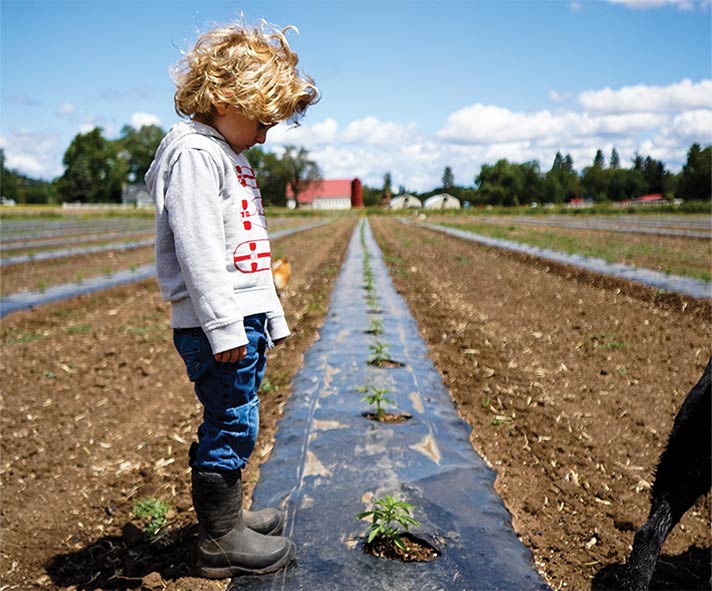Ten years ago, I slid off the Gary West Meats roof during a December storm. Each surgery confirmed it was not my best decision. That fall still impacts our family’s path. At the time, opioids were still the go-to for chronic pain. I attempted to work a month after leaving the hospital. But pills left me foggy and unable to focus. That is probably a good thing, given how the opiate story unfolded.
During recovery my son had brought me some generic CBD cream. I was skeptical. The jar sat unused for weeks. Reluctantly one day I tried some. I did not expect to become a convert. But shortly after, the pain subsided, and my head was clear. Cannabidiol (CBD) can be extraordinary. It is misunderstood, over-hyped and under-studied. But for many of us it provides an effective palliative tool. CBD worked for me, but so little was known, and there were no regulatory bodies. I wanted to know exactly what was in this product.
We began growing high CBD plants on our Old Stage Rd farm. Family Matriarch Whitney dusted off her herbal remedy books. We produced topicals and creams and tinctures. Hundreds of family and friends sampled our formulas provided in exchange for feedback. My father is a retired pediatrician. He uses the topical on his knees after replacement surgery, as ibuprofen doesn’t work for him. We weren’t aware how many suffer chronic conditions unresponsive to traditional western medicine. After dialing in our recipes, we formalized our operation as Horn Creek Farms. It has taken over our daily lives with exhausting but deeply fulfilling work.
Per the USDA farm bill, “Industrial Hemp” is the Cannabis Sativa L. plant with high CBD content and virtually all psychoactive THC removed. It looks and smells the same as its potent cousin. High-THC Cannabis Sativa L. is referred to as medical or recreational marijuana. Other industrial hemp cultivars grown for fiber or seed are very different plants. They are not yet grown locally.
Southern Oregon is among best places to cultivate hemp and marijuana in the US – and perhaps in the world. This created two problems. Local hemp farms proliferated, shoehorned into every piece of suitable land. Many were messy affairs, with plastic strewn about and pirated water. But hemp can also be grown in a legal, aesthetically pleasing and responsible manner.
We heard rumors of marijuana being grown in those hemp fields. Then last year all pretense was removed as indiscrete black market grows took over. These left environmental and legal messes for landowners. Licensed Cannabis ops were among the most negatively impacted. Illegal grows took water and drove land and supply prices skyward. PR was a disaster, as the public can’t differentiate between white market and black-market farms. Ultimately these operations resulted in two additional restrictions to legal grows—HB 3000 and SB 1564.
HB 3000 provided resources to law enforcement, water regulators and code enforcers. SB1564 placed a moratorium on new license applications. These efforts seem to be effective, but we won’t know until later this summer. So far there isn’t nearly the level of illicit activity. Market conditions also factor in. Much of the legislation makes good sense. It addressed hemp farms which were growing black market weed under disguise. New laws made OLCC field testing easier, which is good. But many other changes mostly restrict legit operations. That is just the way regulations work. New rules aren’t necessary for those who follow the law, but law enforcement can’t tell who is on which side. And the black market is not known to follow rules.
Today Horn Creek ships raw hemp and formulated CBD products around the world. Everyone in the family participates. Whitney is our head grower and product formulator. Our oldest daughter does the books. Her husband runs field operations. Our youngest does marketing and social media. Two grandchildren keep morale high. Growing hemp has given us the wonderful experiences of working a family farm.
In this space, I will address news and local developments in this evolving industry. This year will see material change. Many players have moved on. Farming isn’t as easy as it seems. Water restrictions, field audits and more enforcement are changing the landscape. Agencies are working to stabilize and manage this young movement. New science will come forth now that universities are able to do research. I will share developments in research, legislation and trends around CBD in Southern Oregon.
Hemp can be a healthy and beneficial crop. It provides a much-needed boost for our rural areas. Hemp sequesters more carbon than most other crops. Oregon can and should be a world leader in this developing industry. We must shape it so that a legal hemp farm is as good a neighbor and community member as any other crop.
Paul Murdoch grew up in the Rogue Valley. He and his family operated Gary West Smoked Meats before changing focus to CBD and Hemp agriculture. Paul serves on the Oregon Department of Agriculture Hemp Commission. Contact him at paul@horncreekhemp.com or 541-261-4900.
